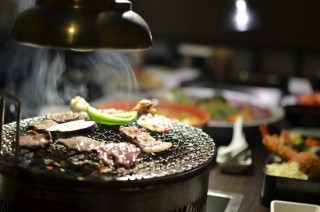Loading
Search
▼ Business is booming for yakiniku restaurants, but are customers chemically dependent on meat?
- Category:Other

ROCKET NEWS
Yakiniku (Korean barbecue) restaurants have been popular in Japan for a long time now. People around here can’t seem to get enough of managing their own grill and eating copious amounts of pure meat. However, in recent years Japan seems to really be getting into red meat what with romantic meat themed video games and classily stacked Quarter Pounders for a king’s ransom.
Particularly around the summer season Japanese people appear to be craving red meat extra hard. News Post Seven reports that of all types of restaurants in Japan, the yakiniku sector has grown a hearty 14 percent compared to the previous year. It was the only type to grow over 10 percent – an impressive feat in this sluggish economy. As a result we are seeing other restaurants and bars adopting charcoal grills to tap into this success.
To answer the million dollar question of why Korean barbecue is going so strong, News Post Seven‘s Tatsuya Matsura came up with an interesting theory. Let’s see if it holds water and maybe a little BBQ sauce too.
■ Where’s the eel?!
Eating eel in the summer in Japan is almost a ritual. Despite the sweltering temperatures some people look forward to this season to get their hands on some unagidon which is a cut of eel slathered in a uniquely delicious sweet sauce atop a bowl of rice, praised for its ‘stamina’ boosting properties.
However, these eels have been declining in number sharply recently, possibly due to overfishing and loss of habitat. Greenpeace has added it to their red list of seafood among other aquatic animals in a dangerously unsustainable situation. This means less eel meat, which in turn means higher eel prices resulting in fewer eel eaters. Still, why does this make people turn to beef and pork in such high numbers?
■ The Burger Pimp
To explain the connection between a decline in eel and an increase in red meat, Mr. Matsura points to our brains, namely anandamide. This is a neurotransmitter that encourages humans to eat by rewarding it with chemically secreted pleasure.
Anandamide is said to be affected by THC, the active ingredient in marijuanna. It also reacts to arachidonic acid which can be found in a wide range of seafood, meat, and egg products. So, in effect Mr. Matsura suggests that we can get hooked on meat a similar fashion to narcotics. This theory was also presented in the 1975 documentary Dolemite.
Granted, meat hardly compares to the harder drugs in terms of addictiveness, but as Rudy Ray Moore wisely points out, it can be a gateway drug. And for the people of Japan who eat eel on an annual schedule it could train people’s bodies to subconsciously jones for it when the season rolls around. However, this still doesn’t answer why people are turning to yakiniku.
■ The Replacement Grillers
For the missing link between the eel meat addiction and red meat passion, Mr. Matsura turns our attention to Louis-Camille Maillard. Mr. Maillard was a French scientist who identified why a French fry tastes better than a raw potato and why grilled eel tastes better than a living eel.
Known as the “Maillard reaction”, it’s when high temperatures are applied to a combination of sugars and amino acids (the good stuff that kids go for) a different flavor is produced. We can also detect this effect through smell and visually by the browning that occurs. As such we humans get used to certain types of browning and charring and can expect what taste we’re going to get whether it be the mild golden sweetness of a fresh loaf of bread or dark lines giving a sharp savory taste to a piece of grilled chicken.
So, to conclude Mr. Matsura’s hypothesis, people who are used to eating eel but can’t now have it, turned to the thing which resembles it most: yakiniku. It’s an interesting theory, and I can’t see any major flaws to it. However, of course, the recent booming in yakiniku business could have been triggered by any number of factors.
Now if you’ll excuse me, there’s a yakiniku restaurant down the advertising an all-you-can-eat deal for $25…
- December 5, 2014
- Comment (0)
- Trackback(0)

